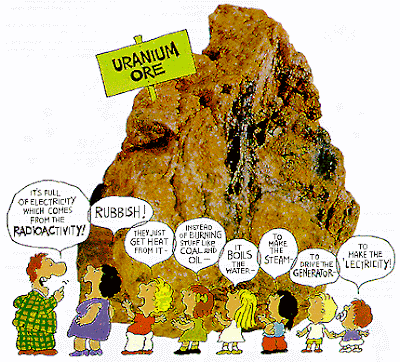URANIUM
 What is Uranium
What is Uranium
- Uranium is a very heavy (dense) metal which can be used as an abundant source of concentrated energy.
- It occurs in most rocks in concentrations of 2 to 4 parts per million and is as common in the Earth's crust as tin, tungsten and molybdenum. It occurs in seawater, and could be recovered from the oceans if prices rose significantly.
- It was discovered in 1789 by Martin Klaproth, a German chemist, in the mineral called pitchblende. It was named after the planet Uranus, which had been discovered eight years earlier.
- Uranium was apparently formed in super novae about 6.6 billion years ago. While it is not common in the solar system, today its slow radioactive decay provides the main source of heat inside the earth, causing convection and continental drift.
- The high density of uranium means that it also finds uses in the keels of yachts and as counterweights for aircraft control surfaces (rudders and elevators), as well as for radiation shielding.
- Its melting point is 1132°C. The chemical symbol for uranium is U.
- South Africa, Namibia and Niger are the three African countries currently ranked among the 10 leading global producers of uranium.
 The Langer Heinrich Uranium Mine located in the west of central Namibia, Southern Africa.
The Langer Heinrich Uranium Mine located in the west of central Namibia, Southern Africa.
 What is Uranium
What is Uranium
No comments:
Post a Comment